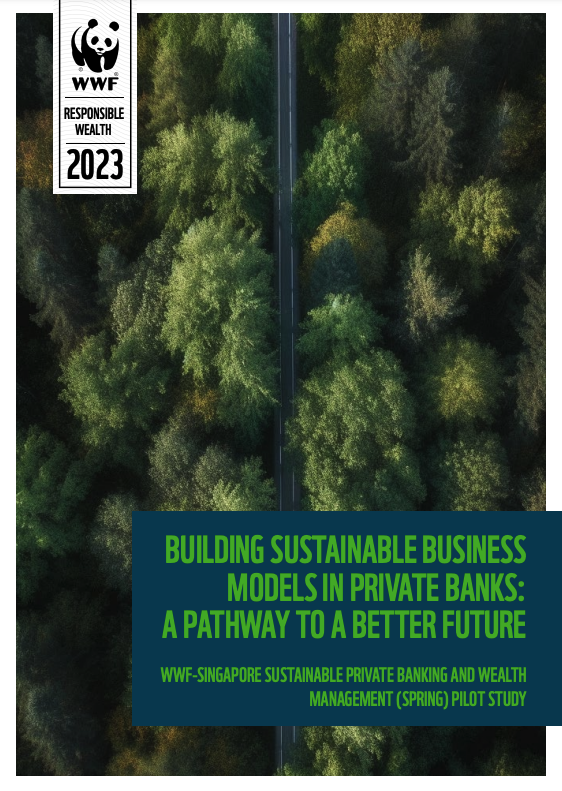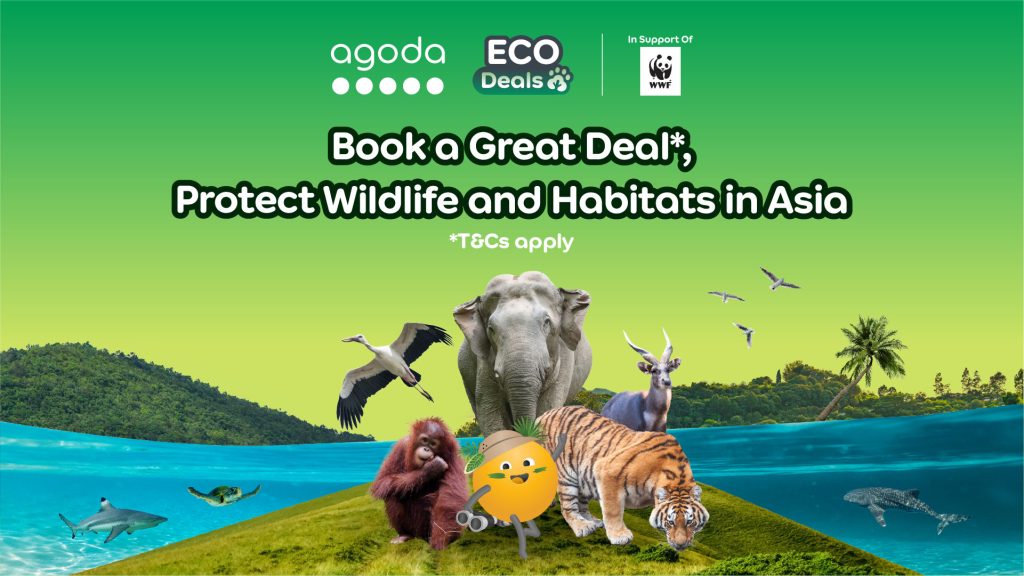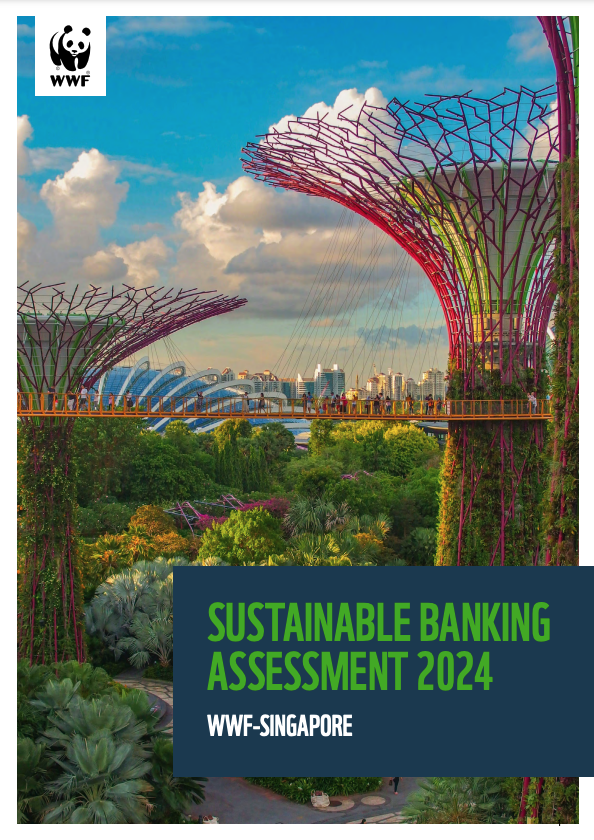- Building on their existing work with commercial banks and asset managers, WWF-Singapore has developed the Sustainable Private Banking and Wealth Management (SPRING) framework for private banks and wealth managers.
- The pilot study, based on the SPRING framework, brings out the first insights into current levels of sustainability integration among the private banking industry.
- The five key findings include a need for stronger risk management and governance structures, increasing ESG considerations in client risk profiling and linking executive compensation to sustainability goals.
SINGAPORE, 5 June 2023 – WWF-Singapore (World Wide Fund for Nature Singapore) recently introduced the Sustainable Private Banking and Wealth Management (SPRING) framework and announced the findings of its pilot study conducted amongst seven private banks with a presence in Singapore. SPRING is introduced at the back of several years of mounting experience in science-based ESG integration assessment tools across banking (SUSBA 2017), asset management (RESPOND 2019) and central banking and financial regulation (SUSREG 2020).
SPRING highlights that ESG considerations are essential in supporting private banks in understanding their clients’ risk profiles and investment preferences. The incorporation of ESG factors into business practices can help private banks manage reputational and regulatory risks, amongst others. Equally, it stresses the importance of client engagement as a paramount element in risk management and how private banks are particularly well positioned to do this as they act as advisors to their clients. Due to their distinct business model, private banks can adopt different strategies to engage, inform, and encourage clients to invest sustainably.
With the growth in Asia’s wealth management revenue expected to reach $90 billion by 2025, private banking in Asia is expected to display significant growth in the coming years as the number of Ultra-High-Net-Worth Individuals (UHNWIs) in the region increases. The framework and pilot are introduced as nearly half (49%) of High-Net-Worth Individuals (HNWI) under 40 are interested in sustainable investments, and banks gear up to the $84 Trillion wealth transition by 2045.
“Finance is a lever for change that can help deliver an equitable, net-zero, nature-positive future. Private banks manage considerable financial resources for their clients and therefore, are in a unique position to advise on sustainable products and services”, said Mr R. Raghunathan, Chief Executive Officer at WWF-Singapore.
Six-pillar framework
The SPRING framework is built on six fundamental pillars (Appendix 1) that emphasise the importance of sustainability in achieving long-term portfolio growth. These pillars underline the role of private banks in supporting their clients to allocate resources to finance sustainable development, connecting to the real economy, and protecting natural capital. Along with the framework’s 48 sub-indicators, it measures the robustness of ESG integration in the private banking sector and encompasses the private banks’ policies, practices, client-related activities, processes, and policies and commitments. It evaluates various areas of the private banks’ business, including investments (discretionary portfolio management – DPM – investment advisory, and execution), wealth planning, and philanthropy.
Following the development of the framework, WWF-Singapore conducted a pilot study from October 2022 to February 2023 with seven private banks that have presence in Singapore and headquarters in the US (1), Europe (2) and Asia (4). The pilot was based on the SPRING framework structure to assess environmental, social, and governance (ESG) integration efforts.
Kristina Anguelova, Head of Asia Sustainable Finance at WWF-Singapore, said: “In our pilot study, we have identified opportunities for private banks to proactively address ESG risks and further integrate sustainability into their operations. With growing wealth in Asia, private banks can engage multi-generational wealth owners to create impact with their assets, social capital and philanthropy.”
Key Observations From WWF-Singapore’s Pilot Study
- Currently, private banks are making commitments to integrate sustainability, however there is a need to tailor and integrate these specifically to the reality of private banking, including measurable targets and increased focus on climate and nature-related risks.
- There is a need for stronger risk management among private banks. There are some green shoots with private banks undertaking ESG risk assessments and scenario analysis, using multiple data sources for due diligence at the group level, but it needs to be an integral part of the private banks’ processes. More so, there is a need for private banks to better incorporate banking best practices such as ESG risk assessments and scenario analysis as part of their own processes
- Majority of private banks have group-level oversight committees. There is limited progress on the appointment of dedicated sustainability officers and in the incorporation of sustainability considerations into board audit and nomination processes.
- ESG considerations also provide an opportunity for banks to understand their clients’ risk profiles and investment preferences and is an area where private banks can progress. Banks that do not factor ESG considerations in their assessment are more vulnerable to reputational and regulatory risks.
- Banks have the potential to make a meaningful impact in advancing sustainability efforts by assisting clients with ESG-focused strategies, exercising delegated voting and engagement rights, as well as advocating for improved business practices within invested companies.
Looking ahead, WWF-Singapore aims to continue to partner with banks, investors, regulators, and stock exchanges in Asia to integrate ESG into mainstream finance and build more resilient and sustainable financial systems.
###
For more information, please contact:
| Marta Bigio marta.bigio@redhill.asia | Victoria Mak victoria.mak@redhill.asia |
About WWF-Singapore
World Wide Fund for Nature (WWF) is one of the world’s largest and most respected independent conservation organisations. WWF’s mission is to stop the degradation of the earth’s natural environment and to build a future in which humans live in harmony with nature.
WWF-Singapore works locally and around the region to create impactful change around climate, circular economy, wildlife, biodiversity and sustainable finance by engaging individuals, communities, businesses and governments. Our mission is to stop the degradation of the planet’s natural environment and to build a future in which people live in harmony with nature.
For more information, please visit wwf.sg.
Appendix 1:
SPRING framework – Six Core Pillars:
| Purpose | Private banks need to recognize that sustainability is a necessary condition for resilient long-term portfolio growth and that they have a crucial role to play in financing sustainable development. |
| Policies | Private banks need to develop and publicly disclose policies that outline their approach to and scope of sustainable investing. |
| Processes | To guide the integration of ESG into internal processes and due diligence |
| People | It is necessary to have well-trained individuals with clearly defined roles and responsibilities, along with robust governance structures that ensure accountability at the board and senior management levels. |
| Products | Sustainable investing is not solely focused on managing risks; it also entails seizing opportunities by offering the appropriate products and services. |
| Portfolio | To ensure that the private bank’s business model is resilient and effectively incorporates sustainability, it is crucial to have a strategic overview and set targets at the portfolio level, enabling the management of risks, impacts, and opportunities. |
Note: More details on the SPRING framework and the full list of sub-indicators can be found in the report.















